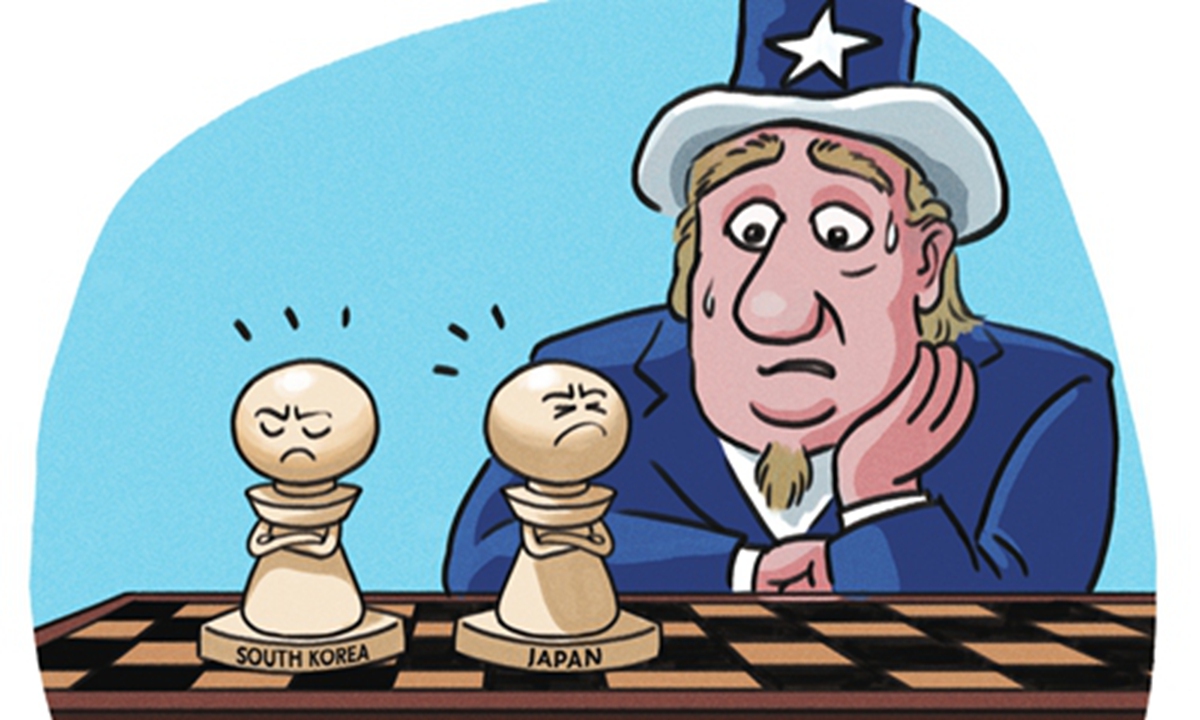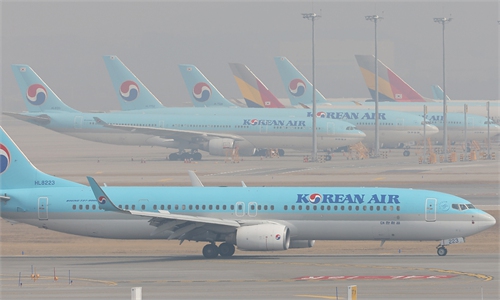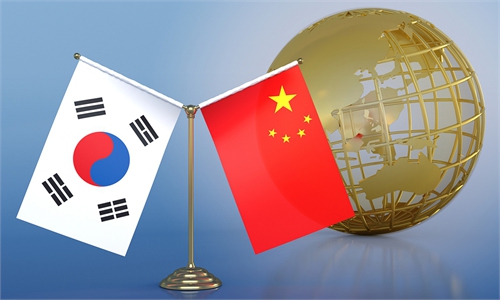S.Korea, Japan returning to correct direction of cooperation is crucial to regional recovery

Illustration: Liu Rui/GT
The 2023 International Forum for Trilateral Cooperation, involving China, Japan, and South Korea, kicked off on Monday in East China's Qingdao. Addressing the first offline event since COVID-19 epidemic, senior diplomats from the three countries expressed willingness to make joint efforts to restart trilateral cooperation mechanism and boost regional economic and social recovery.Wang Yi, a member of the Political Bureau of the Communist Party of China (CPC) Central Committee and director of the Office of the Foreign Affairs Commission of the CPC Central Committee, noted at the forum that the three countries need to send a clear signal that trilateral cooperation will resume. Neighboring countries should practice open regionalism, promote inclusive Asian values, cultivate strategic autonomy, resist the Cold War mentality, and avoid coercion by hegemony.
After decades of development, the economic and trade cooperation among the three countries has become an important driving force for the Asian and global economies. However, in recent years, some countries outside the region have deliberately exaggerated ideological differences, organized exclusive small circles, and split regional cooperation in the Asia-Pacific region in order to seek geopolitical interests.
As the cooperation among the three countries is at a crossroads, the call for maintaining the correct direction of cooperation and cultivating strategic autonomy against coercion by hegemony is necessary and timely in terms of promoting economic and trade recovery in the post-COVID era.
For some time, the rise of protectionism and the abuse of trade restrictions by the US and other countries have seriously disrupted global supply chain cooperation and affected trade among China, Japan and South Korea.
According to the Korea International Trade Association, from last June to this May, South Korea's exports to China experienced negative growth for 12 consecutive months. Japan posted a trade deficit for 22 consecutive months in May with exports to China falling 17.6 percent in the first five months. Japan and South Korea should take practical actions to promote the rebound of economic and trade cooperation with China.
Behind the economic and trade figures is that Japan and South Korea have deviated from the correct direction on the issue of cooperation and cooperated with the US to "decouple and break the supply chain." For example, Japan has included "economic security" into its national security strategy and Japan's semiconductor export restrictions are even severer than those of the US. Currently, the relationship between China and South Korea has been on a negative trajectory, and the Yoon Suk-yeol government even made inappropriate remarks on the Taiwan question.
Experts believe that although South Korea is currently showing positive signs to China, it is more important for it to take more practical actions to promote the recovery of diplomatic and economic and trade relations. Japan's strategic positioning toward China has deviated severely, and its destructiveness has already begun to take hold. Japan should avoid going further in the wrong direction in time.
Of course, there are reasons for political interference from countries outside the region, but there are also reasons Japan and South Korea should reflect on their own. It is hoped that Japan and South Korea will not be coerced by bullying, cultivate independent strategies, actively promote the improvement of economic and trade cooperation with China, and inject new strength into the regional economy.
China, Japan, and South Korea not only share huge common interests, but their trade complementarity is constantly growing, and deepening cooperation among the three countries is beneficial to both the Asian and global economies. With the support of the Regional Comprehensive Economic Partnership and other factors, Asian economic and trade cooperation is facing great opportunities to accelerate economic and trade recovery in the post-COVID era.
In fact, Japan and South Korea are also victims of bullying and protectionism in economic and trade cooperation. The economies of Japan and South Korea have also been hit hard by the US' moves disrupting global supply chains. Therefore, it is extremely unwise for Japan and South Korea to be involved in the geopolitical chariot of the US and act as an accomplice in Washington's "decoupling and breaking of supply chains" and suppression of China.
China has always been firmly opening up its market and actively promoting the deepening of economic and trade cooperation with Japan and South Korea, as well as regional integration. China's continued efforts provide important opportunities for Japanese and Korean companies. Japan and South Korea should help their companies seize these opportunities, instead of falling into the political trap of the US and allowing political factors to undermine regional development.
The author is a reporter with the Global Times. bizopinion@globaltimes.com.cn



